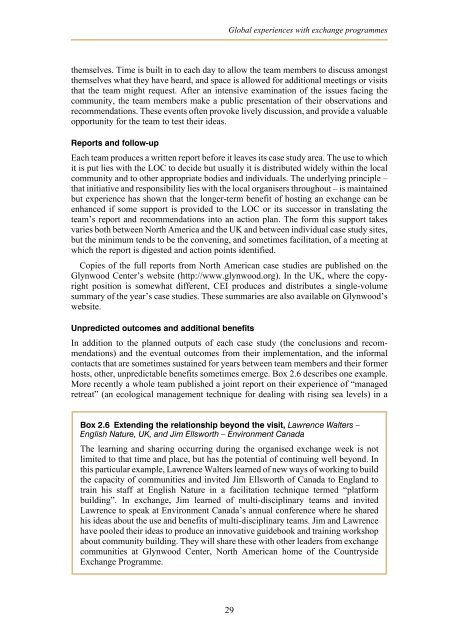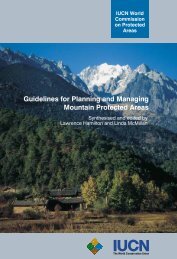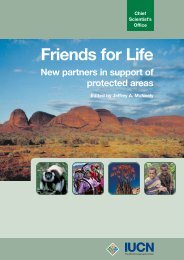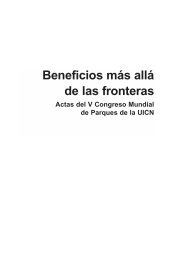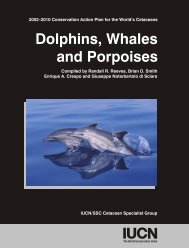Exchange programmes - IUCN
Exchange programmes - IUCN
Exchange programmes - IUCN
Create successful ePaper yourself
Turn your PDF publications into a flip-book with our unique Google optimized e-Paper software.
themselves. Time is built in to each day to allow the team members to discuss amongst<br />
themselves what they have heard, and space is allowed for additional meetings or visits<br />
that the team might request. After an intensive examination of the issues facing the<br />
community, the team members make a public presentation of their observations and<br />
recommendations. These events often provoke lively discussion, and provide a valuable<br />
opportunity for the team to test their ideas.<br />
Reports and follow-up<br />
Each team produces a written report before it leaves its case study area. The use to which<br />
it is put lies with the LOC to decide but usually it is distributed widely within the local<br />
community and to other appropriate bodies and individuals. The underlyingprinciple –<br />
that initiative and responsibility lies with the local organisers throughout – is maintained<br />
but experience has shown that the longer-term benefit of hosting an exchange can be<br />
enhanced if some support is provided to the LOC or its successor in translatingthe<br />
team’s report and recommendations into an action plan. The form this support takes<br />
varies both between North America and the UK and between individual case study sites,<br />
but the minimum tends to be the convening, and sometimes facilitation, of a meeting at<br />
which the report is digested and action points identified.<br />
Copies of the full reports from North American case studies are published on the<br />
Glynwood Center’s website (http://www.glynwood.org). In the UK, where the copyright<br />
position is somewhat different, CEI produces and distributes a single-volume<br />
summary of the year’s case studies. These summaries are also available on Glynwood’s<br />
website.<br />
Unpredicted outcomes and additional benefits<br />
Global experiences with exchange <strong>programmes</strong><br />
In addition to the planned outputs of each case study (the conclusions and recommendations)<br />
and the eventual outcomes from their implementation, and the informal<br />
contacts that are sometimes sustained for years between team members and their former<br />
hosts, other, unpredictable benefits sometimes emerge. Box 2.6 describes one example.<br />
More recently a whole team published a joint report on their experience of “managed<br />
retreat” (an ecological management technique for dealing with rising sea levels) in a<br />
Box 2.6 Extending the relationship beyond the visit, Lawrence Walters –<br />
English Nature, UK, and Jim Ellsworth – Environment Canada<br />
The learningand sharingoccurringduringthe organised exchange week is not<br />
limited to that time and place, but has the potential of continuingwell beyond. In<br />
this particular example, Lawrence Walters learned of new ways of workingto build<br />
the capacity of communities and invited Jim Ellsworth of Canada to England to<br />
train his staff at English Nature in a facilitation technique termed “platform<br />
building”. In exchange, Jim learned of multi-disciplinary teams and invited<br />
Lawrence to speak at Environment Canada’s annual conference where he shared<br />
his ideas about the use and benefits of multi-disciplinary teams. Jim and Lawrence<br />
have pooled their ideas to produce an innovative guidebook and training workshop<br />
about community building. They will share these with other leaders from exchange<br />
communities at Glynwood Center, North American home of the Countryside<br />
<strong>Exchange</strong> Programme.<br />
29


